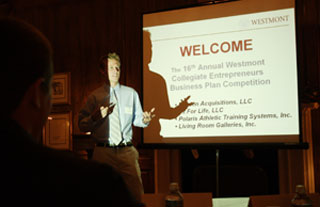College Entrepreneurs Unveil Plans
By
Westmont
 More than two dozen entrepreneurial students have put their innovative business ideas to the test in hopes of competing in the 17th annual Westmont Collegiate Entrepreneurship Business Plan Competition, Thursday, Dec. 7, at 4:45 p.m. in Kerrwood Hall’s Hieronymus Lounge. The competition is free and open to the public.
More than two dozen entrepreneurial students have put their innovative business ideas to the test in hopes of competing in the 17th annual Westmont Collegiate Entrepreneurship Business Plan Competition, Thursday, Dec. 7, at 4:45 p.m. in Kerrwood Hall’s Hieronymus Lounge. The competition is free and open to the public.
Seven student venture teams submitted business plans for preliminary screening, but only the top four will be invited to make formal presentations at the competition. A panel of five outside experts will judge the competition: Eli Eisenberg, founder and CEO of StraightLine Management; Susan Block, investment banker with Block-Bowman & Associates; Stender Sweeney, entrepreneur and active member of the Pasadena Angels investor group; Diana Starr Langley, active entrepreneur with a 20-year track record of start-up ventures; and Jason Spievak, former CFO of Callwave and active angel investor.
Each of the four teams will have 15 minutes to present their business plan, followed by 20 minutes of questions from the panel.
The student venture teams endure a rigorous 16-week schedule and continuously hone their innovative ideas through repeated tests of feasibility, viability and long-term sustainable profit potential. The result is a 20-30 page industry-standard business plan, a professional executive summary, and a high-quality oral presentation with accompanying slides.
Students often get direct introductions to seed-capital investors and other professionals. The top ventures are also entered into collegiate business plan events around the country. Over the past 16 years, 20 Westmont venture teams have been selected to present at national events. The 2003 venture team, Solum Monitoring Systems, won first prize and $7,500 at the Midwest Enterprise Creation Competition in Indianapolis.
The competition is part of the Entrepreneurship and New Venture Development course at Westmont, taught by David Newton, professor of entrepreneurial finance, who founded the college’s entrepreneurship program in 1990. He previously taught for five years in the graduate program at Pepperdine and one year at the University of Massachusetts in Amherst. The course examines all aspects of entrepreneurship and the process of envisioning, researching, and launching a new venture.
Filed under
Academics, Student Stars